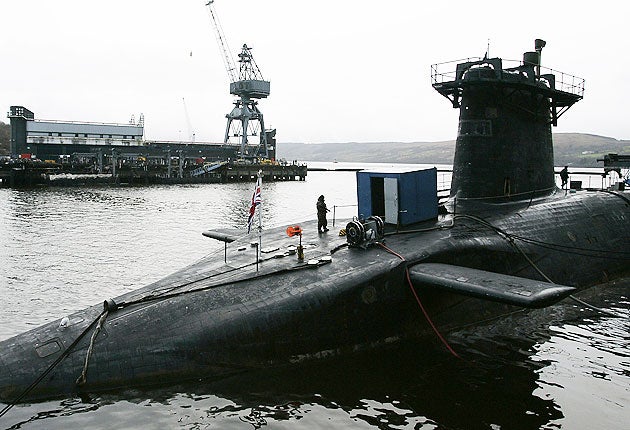Government to annex Trident base in independent Scotland? Not credible, says No 10

Your support helps us to tell the story
From reproductive rights to climate change to Big Tech, The Independent is on the ground when the story is developing. Whether it's investigating the financials of Elon Musk's pro-Trump PAC or producing our latest documentary, 'The A Word', which shines a light on the American women fighting for reproductive rights, we know how important it is to parse out the facts from the messaging.
At such a critical moment in US history, we need reporters on the ground. Your donation allows us to keep sending journalists to speak to both sides of the story.
The Independent is trusted by Americans across the entire political spectrum. And unlike many other quality news outlets, we choose not to lock Americans out of our reporting and analysis with paywalls. We believe quality journalism should be available to everyone, paid for by those who can afford it.
Your support makes all the difference.The Government has downplayed reports that it is considering controversial plants to annex its Trident nuclear base in Scotland amid a storm of protests from Scottish politicians.
According to reports, Ministry of Defence officials are exploring the idea of classifying the Faslane naval base on Gare Loch as a sovereign UK territory ahead of a potential ‘yes’ vote in the upcoming referendum on Scottish independent next year.
The Trident outpost, which houses Britain’s fleet of Vanguard nuclear submarines, has been a political focal point for Scotland's ‘yes’ campaign, which has struggled to capitalise on initial, short-lived excitement surrounding the referendum.
As a result, the Scottish Independence Party (SNP) has pledged to expel nuclear weapons from the country should they secure independence, reportedly leaving the Coalition in the difficult position of choosing to relocate the base or co-opt the area into the new UK.
The latter would leave the military dock with the same status as similar bases in Cyprus, which have long been treated as sovereign territory.
Suggesting the creation of contingency plans for a Scottish vote to withdraw from the Union, a government source told The Guardian: "The sovereign base area is an option - it is an interesting idea because the costs of moving out of Faslane are eye-wateringly high."
However, Number 10 this morning said it was not "credible or sensible" to designate Faslane as sovereign UK territory in the event of Scottish independence. Downing Street later Tweeted: "This govt has not commissioned contingency plans over Faslane. No such ideas have come to SoS [Secretary of State] or PM. They would not support them if they did."
The reversal follows a string of attacks from leading SNP figures. Speaking yesterday, Angus Robertson, leader of the party in Westminster, said: "This is an extraordinary attempt by Westminster to bully Scotland. Neither the people nor parliament of Scotland want nuclear weapons dumped here, and we are clear that Trident would have to be removed as quickly as possible.
“Only a yes vote next September will empower Scotland to get rid of Trident, and the money saved help build a fairer society and stronger economy."
Scotland's Deputy First Minister Nicola Sturgeon added such a move could not go ahead without the agreement of the Scottish Government, which would by unlikely.
"This seems to me to be an outrageous attempt at bullying by the UK Government," Ms Sturgeon told BBC Radio's Good Morning Scotland programme. "I can't see how they could do that without the agreement of the Scottish Government and speaking for my party that is not an agreement that would be forthcoming."
She insisted it was a "preposterous threat from the UK Government" and added: "I think it would be far better for the UK Government, rather than issuing threats via the media, if they were to sit down round a table with us now and have a sensible, grown up discussion about what we need to do to get rid of Trident in the event of a Yes vote."
Ms Sturgeon continued: "Politicians, often and sometimes justifiably, get criticised for a lack of principle - getting rid of Trident is an issue of principle, certainly for the party and government that I represent.
"It's not a bargaining chip. Trident nuclear weapons, weapons of mass destruction that we're supposedly trying to get rid of from the rest of the world, are not right, they're immoral, they don't serve any useful purpose, they take up obscene amounts of money that would be better spent on conventional forces, on social and public services."
Join our commenting forum
Join thought-provoking conversations, follow other Independent readers and see their replies
Comments